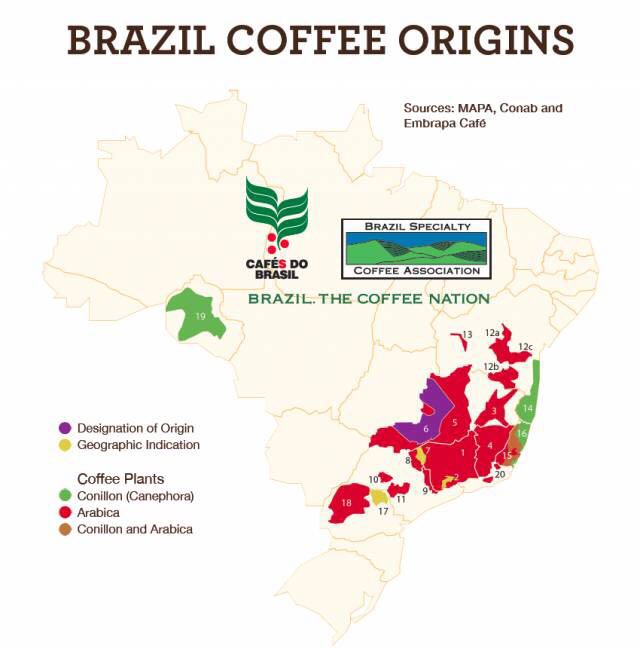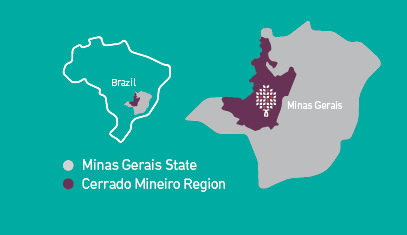According to the Brazilian production area, the raw coffee beans in the South Minas Hilado region are all Arabica species.
For professional baristas, please follow the coffee workshop (Wechat official account cafe_style)
Brazil is the world's most important producer of raw coffee beans, accounting for about 1% of the world's total output. Although its output has been surpassed by Vietnam in recent years, its important position in the global coffee market is still difficult to shake. Because its exports of raw coffee beans are all Arabica (Brazil's small amount of Robusta coffee is not enough for its domestic consumption. Vietnam exports the vast majority of raw coffee beans). In addition, Brazil is the second largest coffee consumer in the world after the United States, and its consumption is close to that of the United States and has a tendency to exceed it.
Brazil has 27 states and 17 states produce coffee, but 7 of them produce the most coffee.
State of Sao Paulo (Mogiana, Centro-Oeste)
State of Parana (Norte Pionerio do Paran á)
Bahia State (Planaltoda Bahia, Cerrado da Bahia, Atlantico Baiano)
Espiritu Santo (Montanhas do Esp í rito Santo, Conilon Capixaba)
Minas Gerais State (Sul de Minas, Cerrado Mineiro, Chapada de Minas, Matas de Minas)
Londonia (Rond?nia)
Rio de Janeiro State (Rio de Janeiro)

The Brazilian Fine Coffee Association (BSCA), located in Varginha, South Minas, is a non-profit coffee organization founded by 12 Brazilian coffee producers in 1991.
BSCA aims to improve the quality of coffee production in Brazil, to promote the commercialization and industrialization of Brazilian coffee, and to develop ecological agriculture through cooperation between domestic and international organizations to help the sustainable development of coffee growing areas.
Minas Gerais Minas Gerais
South Minas / Sul de Minas
The small manor area produces about 8-10 million bags of coffee beans growing on the mountain. Suitable altitude, undulating terrain and climate conducive to growing coffee, rainfall is concentrated in the months when the fruit needs to grow, and the climate is dry in the months when the harvest is needed.
Syrador / Cerrado Mineiro
Growing coffee in Hirado (also known as Savannah) is a victory for Brazilian coffee technology. More and more large coffee plantations in Syracuse use high technology for production, and this is the case in very few areas. Plateau climate, four distinct seasons, fruit ripening is very stable, in the harvest season is not at all. Savannah coffee is generally treated in the sun, which is also a trend in current processing.
Minas Shapada / Chapada de Minas
In the northern part of Minas Gerais, the area is very small, but the quality of raw beans is among the best in the world.
Mount Minas Gerais / Matas de Minas
It is a very large area with a very diverse ecosystem and is the oldest coffee growing area in Brazil, and its highest altitude is the best area for coffee processing.
About Brazilian Coffee producing areas: Cerrado Mineiro
Cerrado Mineiro Region, located in the northwest state of Minas Gerais, Brazil, has a climate suitable for coffee growth-wet and rainy summers, followed by mild and dry winters. The average height is 700m, the average annual temperature is 24 ℃, and the average annual rainfall is 1300-2000mm. The rainfall is abundant and the dry and wet seasons are distinct.
Cerrado Mineiro Region is the only producing area in Brazil with "Origin Certification Protection" (PDI,protected Geographical Indication). Coffee planting is 800-1300m above sea level. There are 4500 coffee farmers in the area, which can produce 500000 bags of coffee every year, with a total harvest area of 170000 hectares.
Cerrado Mineiro production area strengthens coffee quality control through certification system, not only the farm management certification system based on GIS, but also a good traceability system for coffee beans. Certified coffee, each batch has a cup test report, each bag of coffee has a certification logo, and complete traceability information can be obtained from the website.
Generally speaking, Cerrado Mineiro coffee shows nutty and caramel dry aroma, medium to high quality mellow, good long finish, milk chocolate taste, citrus flavor.
Important Notice :
前街咖啡 FrontStreet Coffee has moved to new addredd:
FrontStreet Coffee Address: 315,Donghua East Road,GuangZhou
Tel:020 38364473
- Prev

About Brazil South Minas producing area Brazilian Coffee beans Raw material Brazilian Fine Coffee Association BSCA
For the exchange of professional baristas, please follow the coffee workshop (Wechat official account cafe_style) Coffee is produced in seven states across Brazil, with a total of 14 coffee producing areas, Sao Paulo (Mogiana, Centro-Oeste), Parana (Norte Pionerio do Paran), Bahia (Planaltoda Bahia, Cerrado da Bahia, Atlantico Baiano), Saines.
- Next
About Kenya AA TOP Kirinaga
Kenya AA TOP Kirinyaga Baragwi Gachami GP Origin Profile 1. Kirinyaga is a mountain Kirinyaga, written in Chinese Kirinyaga. Easily found on maps, this is the name of the highest peak of Mount Kenya, Kenya's highest and Africa's second highest, and the local name of Mount Kenya. The reason why Europeans call Mount Kenya
Related
- Does Rose Summer choose Blue, Green or Red? Detailed explanation of Rose Summer Coffee plots and Classification in Panamanian Jade Manor
- What is the difference between the origin, producing area, processing plant, cooperative and manor of coffee beans?
- How fine does the espresso powder fit? how to grind the espresso?
- Sca coffee roasting degree color card coffee roasting degree 8 roasting color values what do you mean?
- The practice of lattes: how to make lattes at home
- Introduction to Indonesian Fine Coffee beans-- Java Coffee producing area of Indonesian Arabica Coffee
- How much will the flavor of light and medium roasted rose summer be expressed? What baking level is rose summer suitable for?
- Introduction to the characteristics of washing, sun-drying or wet-planing coffee commonly used in Mantenin, Indonesia
- Price characteristics of Arabica Coffee Bean Starbucks introduction to Manning Coffee Bean Taste producing area Variety Manor
- What is the authentic Yega flavor? What are the flavor characteristics of the really excellent Yejasuffi coffee beans?

